
We have a confession to make. Except for our Shunyi Correspondent, none of the editors at beijingkids have kids. For the most part, we’re able to make up our lack of experience through research, interviews, and getting to know families in Beijing. However, there are times when research only goes so far. For instance, we can’t possibly understand what it’s like to bring a child into the world. So, we turned to the people who know best: our readers. For the maternity issue, we spoke to eight families about their experiences of being pregnant and giving birth in Beijing. In addition, we asked mothers and parenting experts about the best way to have an intervention-free birth. We hope that you’ll find guidance and encouragement from their stories.
The Andell-Mascarella Family
Parents: Stacy Andell and Kade Mascarella
Children: Peregrine (3 years) and Taliesin (7 months)
Nationality: American
Number of years in Beijing: Six
Hospital: Amcare Women’s and Children’s Hospital (prenatal and delivery)
Why did you decide to raise a family in Beijing?
Stacy: We’ve lived all over the world but Beijing is the first place we felt we had the best overall opportunities for our family. So much is available here and so much is going on. Our children have countless advantages, such as being fluent in English and Chinese – which is the case for our 3-year-old daughter, Peregrine.
What was your experience of being pregnant in Beijing?
I loved being pregnant here; Chinese people are so sensitive to the needs of pregnant women. I enjoyed taking public transportation because someone always gave me a seat. One time, at Houshayu station, the attendant got on the train with me and announced on her megaphone that someone better get up and give me a seat. I didn’t even ask her; she just did it.
Being pregnant and raising children has totally changed the way I interact with Chinese people. Before I had kids, I was just some random foreigner living in an apartment building. Now I am 佩里和塔里的妈妈 (“Peili and Tali’s mom”) to everyone in our complex.
Why did you choose this particular hospital?
I chose Amcare because it is affordable and has an amazing standard of care. I would read about new tests and procedures just becoming available in the US and Amcare already had them. In the mere two years between my children’s births, Amcare got even newer ultrasound machines.
What was the total cost of healthcare?
Because we paid in advance and I had previously given birth there, we got a 12 percent discount. Prenatal was about RMB 12,000 and the C-section was RMB 45,000. Factoring
in a few other costs, we paid about RMB 65,000 in total.
Was your partner allowed to be present at the birth?
Other than the actual operation (which took about 30 minutes), my husband was with me the whole time. He was able to come into the room immediately after the baby was born, hold her, and sit with me while the hospital staff finished up.
Did you seek out the services of a doula, midwife, lactation consultant, etc.?
Not with this pregnancy.
Did you experience any complications during any stage of your pregnancy or delivery?
Yes, my daughter had a minor kidney problem during the last month of my pregnancy. The doctors were very thorough and called in several specialized ultrasound technicians for consultations. After her birth, they followed up with extra ultrasounds to confirm that the kidney problem had corrected itself. Also, I had a reaction to the anesthetic during my C-section. They immediately fixed it and made sure my husband and daughter could be close to me and give me comfort.
How did you involve your first child in the pregnancy/birth?
With our second child, we decided to find out the gender and give her a name early. This way, we could refer to the baby by name to her older sister. My older daughter Peregrine was very involved in the pregnancy. I let her feel the baby kick and took her to many appointments so she could see the ultrasounds and listen to the fetal monitoring. We also went shopping and bought little shoes to give to the baby.
What advice would you give to other parents regarding pregnancy/birthing in Beijing?
Pregnancy and birth can be extremely stressful but I found that total strangers wanted to be helpful to me. I let them; it helped to let other people into our happiness.
Do you have any tips for the day of the delivery?
Don’t panic. Trust your doctors and your family.
If you are calm and collected, then they will be too.
Did you engage in any local maternity practices (e.g. yuezi)?
I did drink some lactation tea after the birth, but I also bought a lot of extra waterproof bandages for my C-section scar. I couldn’t give up taking a shower!
What were the most valuable maternity resources you found in Beijing?
Since this was my second child, I was a lot better prepared this time around. I was grateful for the Beijing Cafe Yahoo group, where I found some discounted baby items.
What would you do differently next time?
It’s hard to say. I think I learned a lot between my two pregnancies; I was overall pretty happy with this experience.
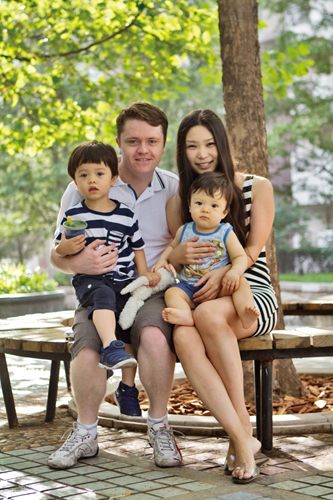
The Carr Family
Parents: Aejoo Sook and Chris Carr
Children: Edward (2 years) and Alexander (11 months)
Nationality: Aejoo is Korean and Chris is Australian; Edward and Alexander hold dual Korean-Australian citizenship.
Number of years in Beijing: Six
Hospital: Beijing United Family Hospital (prenatal and delivery)
Why did you decide to raise a family in Beijing?
Aejoo: We were married before moving here in late 2007 for Chris’ work, so it was a natural choice at this time in our lives.
What was your experience of being pregnant in Beijing?
The first time was much easier. Already having a little one, in addition to being away from family and other support networks, was tough. Although domestic help is available, they can never be fully trusted when it comes to family and small children.
The biggest surprise for us is that our second son was born here at all. We were scheduled to travel to Australia when I was 30 weeks pregnant, but Alexander had other ideas and was born prematurely. The post-natal care and facilities at Beijing United Family Hospital (BJU) were better than we expected, as was the thoroughness and attentiveness of the Neo-Natal Intensive Care Unit (NICU) team. We were also surprised by how well the different doctors communicated; we were initially concerned they may not be linked up.
Why did you choose this particular hospital?
We originally chose BJU for our older son’s pre-natal care based on a friend’s recommendation. Their family medicine clinic had treated me once and was very patient-focused. We were very impressed with their approach and standard of care. We would certainly recommend them because despite a very difficult set of circumstances, they managed to get us a first-class level of support.
What was the total cost of healthcare?
Having a premature baby with some complications made the process very expensive. This was covered by Chris’ health insurance so I’m not sure what the ultimate cost breakdown was.
Was your partner allowed to be present at the birth?
Yes he was, although he didn’t fare very well and nearly passed out.
Did you seek out the services of a doula, midwife, lactation consultant, etc.?
No.
Did you experience any complications during any stage of your pregnancy or delivery?
Alexander was born at 30 weeks, which was very, very early. We still don’t really know why. It was incredibly taxing; for the first week or so, we were going back and forth to BJU three to four times daily. After Chris’ mother arrived, things were much easier since we had a grandparent who could stay with Edward. Then my mother came, which made Edward feel very special; two grandmothers doting on him in the space of two weeks was exciting.
Having a car made a big difference, as it meant we were able to be far more flexible. The hospital staff was also incredibly flexible in terms of when we could see doctors, get updates, etc. There was even a possibility of repatriating Alexander for treatment. The responsiveness of the Australian embassy shouldn’t be overlooked here; if you’re in need, they can do remarkable things for Australian citizens.
I also had gestational diabetes, which was dealt with very professionally and efficiently by BJU. They arranged for a nutritionist and it was ultimately managed through diet rather than medicinal means.
We coped with all of this by discussing what the plan was each day. With preemies, you’re on a rollercoaster ride where every day brings new twists and turns. We were thrown into chaos because the delivery happened so early, but talking about our options, priorities, and what would come next really helped.
How did you involve your first child in the pregnancy/birth?
We always referred to the baby by nickname during the pregnancy and kept the same one when he was born. The boys didn’t get a chance to meet each other for until two months after the birth because of all the health issues that Alexander faced. Edward was going through a phase of kicking around a small football at the time, so we got him a big yellow one and made it look like it was a gift from his little brother. They’ve been close ever since.
What advice would you give to other parents regarding pregnancy/birthing in Beijing?
If you can get comfortable with your hospital and doctor, it is something worth considering. If you want to return home for the birth, go early. For us, even seven months of pregnancy was not early enough.
Do you have any tips/advice for the day of the delivery?
Expect the unexpected. Your baby needs you to be as calm as possible. That said, always ask your doctor in case of concern. If you’re admitted early, make sure to express your concerns and make sure that you are being checked regularly.
Did you engage in any local maternity practices (e.g. yuezi)?
Koreans have similar practices like staying indoors, keeping warm, and eating a very restricted diet. My mother was an expert on this, so I engaged in these practices to the extent possible during her visit.
What were the most valuable maternity resources you found in Beijing?
The Korean community is very good at sharing information; I found them to be a very valuable resource. Visits from family at short notice also meant we were able to get access to many things from Australia and Korea. Chris’ secretary somehow managed to source imported premature baby fortifier, which was scarce it was at the time. Sometimes, it’s best to ask as many people as possible for help.
What would you do differently next time?
I would certainly return to BJU. Their service and support was excellent under particularly stressful circumstances. That said, I’m Korean. My husband is from Australia. We met in China back in 2000. We have one son born in Korea and one born in China – perhaps the next child could be born in Australia? (Although hopefully it’s a girl!)
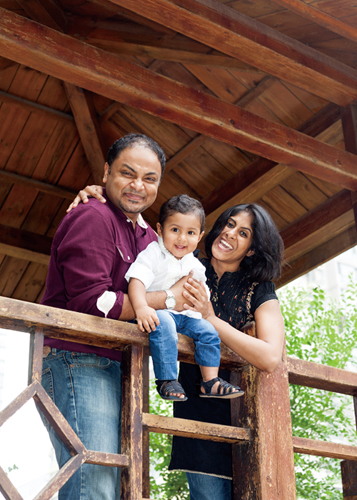
The Geevarghese Family
Parents: Benita Sumita and Danny Geevarghese
Child: Yohan (10 months)
Nationality: Indian
Number of years in Beijing: Two
Hospital: Peking Union Medical
College Hospital (prenatal care up to eight weeks) and Mary’s Hospital for Women and Infants (delivery and prenatal care)
Why did you decide to raise a family in Beijing?
Benita: The time was right.
What was your experience of being pregnant in Beijing?
We found out that I was pregnant soon after moving to Beijing. We were just finding our feet, so the pregnancy definitely came as a surprise and added to our experience of being fresh-off-the-boat Beijingers. From looking for the best breweries and cafes, we quickly shifted our focus to finding the right hospital and reading one online forum after the next to figure out what it would mean to have a baby in China.
To be honest, I was a bit apprehensive because of the language barrier. We knew next-to-nothing when it came to Mandarin. However, that didn’t stop us from finding the information we needed, thanks to friends, colleagues, and other Beijingers. We were informed that we had to choose a hospital by the ninth week of pregnancy or hospitals might not register you as a patient.
The first eight weeks, I went for tests and checkups at Peking Union Medical College Hospital (PUMCH). However, I couldn’t continue there because the hospital was booked out for the Year of the Dragon.
Doctors here are overly-cautious, and this was also unusual for me and my husband. I guess this has to do with the one-child policy; extra steps are taken to ensure that everything is OK. The number of tests and scans can be exhausting but it can put you at ease to know that doctors are being extra careful.
Why did you choose this particular hospital?
We chose Mary’s Hospital for Women and Infants for several reasons. It offered the same services as Amcare or BJU (hospitals that I also visited and considered), it was close to our residence, it was located close to the subway and bus station in case we couldn’t get a cab, it was cheaper, and it offered translators (as at Amcare). I would definitely recommend Mary’s; the doctors and staff are friendly and caring.
What was the total cost of healthcare?
In total, we paid around RMB 39,300 for delivery and prenatal care. The prenatal care cost just under RMB 10,000 and the delivery package came to RMB 30,000. The RMB 30,000 is prepaid; any unused amount is returned when you’re discharged. We used the remaining money for a couple of follow-up visits; at the end, we got around RMB 700 back.
Was your partner allowed to be present at the birth?
Only one person was allowed in the private labor room; in my case, it was my mother. I wanted Danny to come in later, but they were not comfortable with people walking in and out of the labor room.
Did you seek out the services of a doula, midwife, lactation consultant, etc.?
Yes. A one-time consultation with a lactation expert is part of the prenatal package. Mary’s also has Lamaze prenatal exercise classes as part of the package, but I didn’t use these as they were only available in Chinese.
Did you experience any complications during any stage of your pregnancy or delivery?
It was not a complication as much as a snag. My blood type is O positive, so I needed the Rhogam injection to be administered at 28 and 32 weeks. As this injection is not available in China, it had to be shipped in from elsewhere. Mary’s was not able to help me acquire the injection, so we were on our own on this front. We finally managed to get it with help from a Chinese friend.
What were the most valuable maternity resources you found in Beijing?
A blog called Having a Baby in China, Beijing Mamas, and speaking to other mamas in Beijing.
What advice would you give to other parents regarding pregnancy/birthing in Beijing?
Don’t be afraid, be flexible about birth plans, and try not to get carried away by the overcautiousness of doctors in Beijing. They tend to give you worst-case scenarios for every little detail, which can make you wonder if yours will be such a case. This is just their way of being careful.
Do you have any tips/advice for the day of the delivery?
Mary’s does not give you a change of clothes before going into the labor room, so maybe you’ll want to arrive at the hospital in something labor-friendly. There is no need to rush to the hospital too early. I went early to avoid getting stuck in traffic and just in case there were no cabs. But Mary’s was ready with my room even though I went into labor a week early.
Did you engage in any local maternity practices (i.e. yuezi)?
No.
What would you do differently next time?
Get insurance.
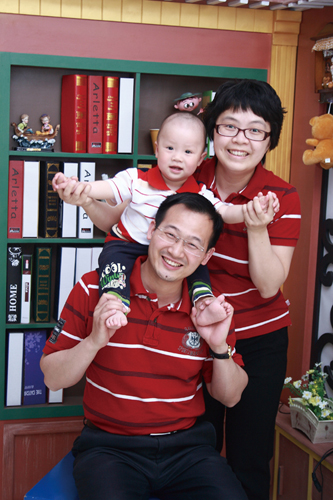
The Chen Family
Parents: Connie Leung and Chen Liang
Children: Zinan a.k.a. Haohao (15 months)
Nationality: Chinese
Number of years in Beijing: Six
Hospital: Beijing Obstetrics and Gynecology Hospital (prenatal and delivery)
Why did you decide to raise a family in Beijing?
Connie: My husband is a lawyer, so there are a lot more business and learning opportunities for him here.
What was your experience of being pregnant in Beijing?
I felt that there were a lot of pregnant ladies during the Year of the Dragon. Every time I went for a walk in the courtyard, I would find two or three moms-to-be walking around with their husbands. I was also surprised by my baby’s unexpected delivery by C-section. Everything I read, enquired about, and prepared for was all about natural delivery. I had never thought about getting a C-section before. When it came, I didn’t even have time to worry about the risks involved.
Why did you choose this particular hospital?
As it was my first pregnancy, I was quite cautious. I consulted nearly all of my “mama” friends. I was torn between private and public hospitals. One weakness of private hospitals is that, even though you can enjoy better care there, you might need to be sent to a public hospital anyway if there’s an emergency. I chose Beijing Obstetrics and Gynecology Hospital (BOGH) because it’s listed as the best public hospital in its field.
To be honest, I wouldn’t recommend it as it is quite a hotspot in Beijing. As a result, there will always be long queues. I was exhausted and frustrated after finishing all the health checks there. One’s mood is quite important during a pregnancy; better service, shorter waiting times, and more interaction between patients and doctors should outweigh the hospital’s fame. After all, every doctor in every hospital is fully-qualified nowadays.
What was the total cost of healthcare?
The breakdown went something like this:
Prenatal: RMB 3,000 (excluding vitamins such as calcium tablets)
C-section delivery: RMB 6,000 (natural delivery would cost less)
Postnatal: It depends on your recovery. Mine cost between RMB 2,000 and RMB 3,000.
Was your partner allowed to be present at the birth?
If you have a natural birth, your husband is allowed to be with you. As I underwent a C-section, he was not allowed to be with me and had to wait outside anxiously.
Did you seek out the services of a doula, midwife, lactation consultant, etc.?
No.
Did you experience any complications during any stage of your pregnancy or delivery?
Twelve days before my due date, the baby was moving far more frequently than usual. I went to the hospital immediately and received some tests and treatment. The doctor told me that the umbilical cord had wound itself around the baby. However, he was safe and I went home. Two days later, my baby had hardly moved for three to four hours so I went back to hospital again and confirmed that the complication was acute cardiac fetal distress.
I was disappointed that I didn’t get to have a natural birth. I was ready to feel the pain, as I was always told that I would feel reborn since no pain is comparable to the pain of childbirth. When my baby was out and sleeping by my side, I could hardly believe he was my son! It seemed as though he came out of nowhere. The C-section was too quick; it didn’t give me enough time to feel like I was going to be a mom.
What advice would you give to other parents regarding pregnancy/birthing in Beijing?
Select a hospital that is close by and offers good care. A pregnant woman’s health and mood should outweigh everything else.
Do you have any tips/advice for the day of the delivery?
Pay careful attention to fetal movement. If the baby moves too frequently or doesn’t move as frequently as usual, go to the hospital without delay.
Did you engage in any local maternity practices (e.g. yuezi)?
Yes, I did engage in the traditional Chinese yuezi. There are a lot of “dos” and don’ts” in the first month. For example, I was told not to wash my head and body for an entire month. However, I surrendered after a week-long trial.
I also hired a yuesao [a specialized post-natal ayi]to help me to look after the baby. I found her through an agency located near the hospital two months before my due date. The ayis recommended by my friends were all booked – some up to a year in advance (all because it was the Year of the Dragon)!
We paid RMB 8,800 (the usual price is around RMB 4,000) for a yuesao to help out for 26 days. Usually, yuesao get one day off per week but she could work 26 days in a row if we needed her to.
Yuesao mainly take care of mother and child; they don’t do housework. They can also bathe and massage the baby, wash the baby’s clothes and diapers, comfort and bottle feed the baby during the night, give advice when the baby is sick, set out a diet and cook for the mother, offer breastfeeding support, wash clothes for the mom (who is not supposed to wash anything during her yuezi), and offer suggestions for recovery and keeping fit.
What were the most valuable maternity resources you found in Beijing?
La Leche League China, which organizes monthly gatherings to provide support for breastfeeding.
What would you do differently next time?
Maintain a nutritious and balanced diet. I’ve put on too much weight this time (22 kg!), and it is really tough to lose it.
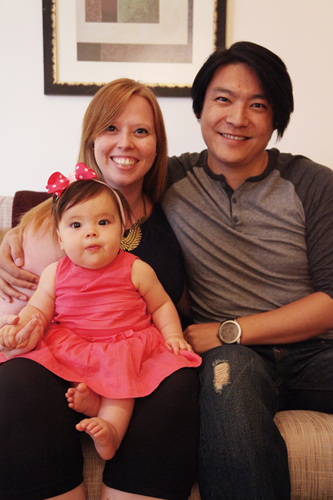
The Kang Family
Parents: Jane and A Du Kang
Child: Alana Marie (6 months)
Nationality: Jane is from the US and A Du is from China. Alana is Chinese-American.
Number of years in Beijing: Six
Hospital: OASIS International Hospital (prenatal and delivery)
Why did you decide to raise a family in Beijing?
Jane: Over the past six years in Beijing, we have developed a good community through my workplace, our neighborhood, and our church. In addition, Beijing is a bustling city with lots of things to do and try, so we felt that having a child here would be just another part of the adventure.
What was your experience of being pregnant in Beijing?
Strangers here were generally very kind to me while I was pregnant. They would willingly give up their seat on buses and would help me in various ways. Hailing a cab was still difficult as people would hop in before me, even though I was noticeably pregnant. Also, when I was out and about I would hear lots of unsolicited advice (and still do). All in all though, it was a very pleasant experience.
Why did you choose this particular hospital?
I loved OASIS International Hospital. I toured all the other big name hospitals in Beijing, but the choice was an easy one. The care I received from doctors, nurses, and even administrative staff was all very personalized. They took the time to answer our questions and made sure we felt comfortable. Their facilities are exceptional and very tastefully decorated. It was such a positive experience that I would recommend it to everyone.
What was the total cost of healthcare?
I purchased the 14-visit prenatal package for RMB 13,800. It was quite a comprehensive package – no surprise fees as we went along. I was also lucky about the timing of purchasing the natural delivery package; I got it at a significant discount because of a Chinese New Year promotion. I paid RMB 25,000 for a three-night stay. I believe the current promotional price for the natural delivery package is approximately RMB 42,000.
Was your partner allowed to be present at the birth?
Yes. The doctors and nurses not only didn’t mind having my husband present, but engaged him during the whole birth experience. A Du felt very much a part of the birth.
Did you seek out the services of a doula, midwife, lactation consultant, etc.?
OASIS has a wonderful midwife who was present at the birth. We met with her several weeks before the delivery and discussed our birth plan. She was very positive about it all and was a huge source of help.
Did you experience any complications during any stage of your pregnancy or delivery?
I fortunately did not experience any complications.
What advice would you give to other parents regarding pregnancy/birthing in Beijing?
Take all the advice you get in stride. People usually mean well, so a smile goes a long way.
Enjoy all the extra attention; you probably won’t ever feel so special again!
Don’t expect yourself to know everything and do everything right. Don’t try to be superwoman; you’ll just end up disappointing yourself. Ask for help when you need it and find good support systems.
Do you have any tips/advice for the day of the delivery?
Make a birth plan beforehand, but allow yourself to be flexible at the actual delivery. You may find that it is not at all what you expected, no matter how many classes you attended, books you read, or people you talked to. On a lighter note, have your favorite music ready to play and a camera ready to capture the wonderful first few moments of life with your new baby.
Did you engage in any local maternity practices (i.e. yuezi)?
I did not zuo yuezi. I was in the shower right away, walking around, eating cold things, and doing all manner of things not allowed in yuezi! I know that my baby and I got more than a few raised eyebrows when we were out and about. My husband supported me 100 percent. However, to each their own.
What were some of the most valuable maternity resources you found in Beijing?
Solana has quite a few wonderful mother and baby stores. Motherswork and Mothercare are great, albeit a bit pricey. Lijia Baby has some more reasonably priced options. I bought most of my maternity clothes back in the US; they were cheaper and fit me well. Also, Beijing Mamas was a great resource for finding things secondhand or asking for advice.
What would you do differently next time?
I would hire an ayi to help out once in a while during the first few weeks after delivery. Not necessarily for baby or momma care, but for running errands and doing housework. An occasional extra pair of hands can be a lifesaver.
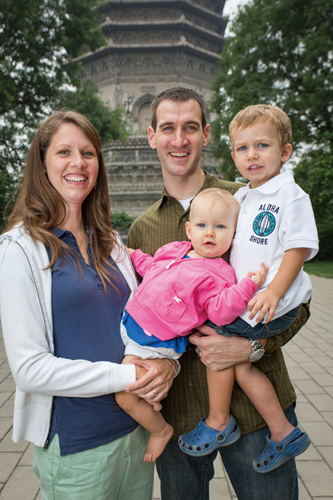
The Hillyard Family
Parents: Jenny and Dan Hillyard
Children: Nathan (age 3) and Katie (almost 1)
Nationality: American
Number of years in Beijing: Two and a half
Hospital: HarMoniCare Women and Children’s Hospital (delivery and prenatal care from four months onwards)
Why did you decide to raise a family in Beijing?
Jenny: My husband’s work brought us here in February 2011. Before that, we’d been living elsewhere in northeastern China.
What was your experience of being pregnant in Beijing?
Overall, my experience of being pregnant in Beijing was positive. Living on the fifth floor of a building with no elevator was not fun. Being pregnant in Beijing in the summer was also pretty miserable, but I find locals to be so
accommodating to pregnant women.
However, I did not expect it to be so hard to find a hospital here – especially after having such a great experience in Changchun, [Jilin province]. I didn’t expect them to fill up so quickly, as I hadn’t considered our baby was going to be born in the Year of the Dragon.
Why did you choose this particular hospital?
We had [our first child]Nathan at a private Chinese hospital in Changchun. When we started looking for a hospital in Beijing, we were shocked at the prices. I started searching online and came across HarMoniCare. They had what I was looking for, including private rooms and epidurals. The prices were less than half of BJU’s. It was also easy to get to – just a few blocks from Anzhenmen station on Line 10.
I would definitely recommend this hospital to anyone who speaks Chinese. The prenatal visits were quick (all scheduled in advance), the staff was friendly, and the stay was very comfortable. My one big complaint was that the natural birth package we paid for upfront included an epidural, but when I asked my doctor about it during labor she kept putting me off again and again until it was too late. I suspect that the anesthesiologist was not in overnight and they didn’t want to call him in. Online, the hospital advertises an English translation service, but when a friend of mine inquired about it they didn’t seem to really have it.
What was the total cost of healthcare?
We paid RMB 37,000 upfront for a package that included prenatal visits, a private room, the delivery, and an epidural. The basic breakdown was RMB 8,800 for prenatal and RMB 28,800 for a natural delivery. This was the price after a 20 percent discount that was part of a promotion HarMoniCare was offering at the time.
Was your partner allowed to be present at the birth?
My husband was allowed to be with me for all of the prenatal visits as well as the delivery.
Did you seek out the services of a doula, midwife, lactation consultant, etc.?
I did not specifically seek out their services, but there was a midwife present at the birth and the hospital had a lactation consultant available if needed.
Did you experience any complications during any stage of your pregnancy or delivery?
During one of the early ultrasounds they found that I had placenta previa, [a condition in which the placenta covers all or part of the cervical opening.]I didn’t fully understand at first when the doctor told me in Chinese. She was very patient and re-explained until I got it. Closer to my due date, the doctor I’d seen all along was going to be out of town for a week. She gave me her cell phone number in case I went into labor early so she could talk to the doctor delivering.
How did you involve your first child in the pregnancy/birth?
One thing I loved about this hospital was that they were so friendly and welcoming to our son. The doctor let Nathan listen to the baby’s heartbeat and talked to him about her. Nathan still talks about Meimei’s [little sister’s]hospital!
What advice would you give to other parents regarding pregnancy/birthing in Beijing?
Especially if it’s your first pregnancy, I would recommend looking at hospitals while you’ still in the planning stages. Then you’ll know what’s available and can make a decision more quickly once you actually get pregnant.
Do you have any tips/advice for the day of the delivery?
With my first child, a friend brought me an ice pack while I was in hospital; it felt wonderful to sit on. I brought one with me this time and didn’t use it as much, but I’m still glad that I had it. Also with my first, I didn’t take any pain medicine at all when I began recovery. After talking to friends, I realized that something as simple as Advil would have been nice. I brought some with me this time.
Did you engage in any local maternity practices (e.g. yuezi)?
No.
What were the most valuable maternity resources you found in Beijing?
Friends, both local and foreign. Several expat friends had delivered at two different hospitals in Beijing; talking to them ruled them both out. Friends reassured me that the placenta previa would likely fix itself, moving upwards as my uterus grew. Several expat friends were also really helpful towards the end of my pregnancy by babysitting my son.
Chinese friends were more careful with their advice and support; they didn’t want me to overexert myself. They were often a good reminder to me to take it easy. When I was out and about, they helped with my oldest son so that I could sit down and rest.
What would you do differently next time?
If we were to give birth at HarMoniCare again, I would want to talk to someone in hospital administration to get more of a guarantee on the epidural. Other than that, I wouldn’t change anything.
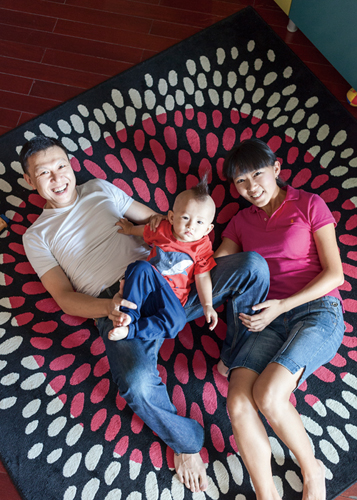
The Wang-Yin Family
Parents: Xiaojing Marsha Wang and Yuefeng Ralph Yin
Child: Johann Clyde (14 months)
Nationality: Marsha is Chinese while Ralph and Johann are American.
Number of years in Beijing: Marsha was born and raised in Beijing while Ralph has lived here for five years.
Hospital: Sino-Japanese Friendship Hospital (prenatal and delivery)
Why did you decide to raise a family in Beijing?
Xiaojing Marsha: We work in Beijing and most of our family is here now.
What was your experience of being pregnant in Beijing?
It was difficult to find a hospital unless you registered early, when you are still in the planning stages. We had to ask our friend (a doctor) for help finding a hospital. Too many people wanted to have a “dragon baby” last year – almost all of the hospitals were full. I had to spend more than half a day to do health checks each time. You’d see a long line of people waiting for blood tests, urine tests, and so on, but the doctor gave me no more than five minutes to ask questions.
Why did you choose this particular hospital?
Sino-Japanese Friendship Hospital was the only public hospital that could receive me; otherwise we would have had to use a private hospital. The hospital is OK if you don’t mind waiting to do prenatal checkups. All of the public hospitals in Beijing were full of pregnant women last year. There were probably fewer expectant mothers at private hospitals, but they would have cost more.
Medical facilities at 3A hospitals [sansheng yiyuan, 三甲医院]such as Sino-Japanese Friendship Hospital in Beijing are good enough, so I had no issue picking it. Sansheng
yiyuan are at the highest level in China’s medical rating system; they normally have better facilities, more technical support and efficiency, and greater quality of care.
What was the total cost of healthcare?
The breakdown was approximately RMB 5,300 for prenatal checkups, RMB 1,600 for a natural delivery, and RMB 270 for postnatal care. The postnatal care consisted of a three-day stay at the hospital and a simple gynecological exam 45 days after delivery. In total, we spent around RMB 7,170.
Was your partner allowed to be present at the birth?
No, I preferred to be alone during the birth. Although it was a memorable occasion in our lives, I would have relied too much on my husband and the delivery would have taken longer. I chose to face the pain by myself to push myself to be more independent and finish as quickly as possible.
Did you seek out the services of a doula, midwife, lactation consultant, etc.?
The hospital didn’t offer such services.
Did you experience any complications during any stage of your pregnancy or delivery?
A type of antibody in my baby’s blood conflicted with mine. I had to go to the Beijing Red Cross Blood Center to do further blood tests. For some reason, I was told to do four additional B-ultrasounds at other hospitals: two at Beijing Obstetrics and Gynecology Hospital and two at Beijing Anzhen Hospital. It’s strange that patients can’t finish all their medical checks at one hospital. Whether public or private, I heard that many pregnant women are asked to go to different hospitals to double check this or that. Luckily, my baby was deemed healthy enough after several rounds of tests.
What advice would you give to other parents regarding pregnancy/birthing in Beijing?
Choose a hospital as early as possible or you risk being rejected by hospitals at full capacity.
If you’re in suitable physical condition, it’s better to give birth naturally than by C-section.
Keep active by doing exercises and not
always staying in bed during the pregnancy. This will ensure a smoother birth.
Do you have any tips/advice for the day of the delivery?
Just take it easy, don’t be too nervous, and follow the doctor’s instructions.
Did you engage in any local maternity practices (i.e. yuezi)?
Not really. I stayed at home for one month but I didn’t always stay in bed. I used the air conditioner, brushed my teeth, drank cold water, and ate what I wanted in the month following delivery.
What were some of the most valuable maternity resources you found in Beijing?
The Internet. I got all my information from websites like BabyCenter (www.babycenter.com), Beijing Mama (www.bjmama.com, Chinese-only and not to be confused with the Beijing Mamas Yahoo group), and BabyExpert (www.babyexpert.com).
What would you do differently next time?
We would find the hospital earlier.
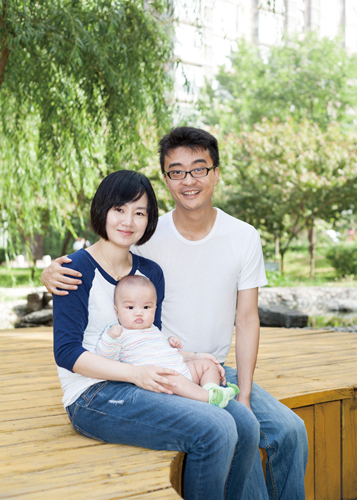
The Guo-Wu Family
Parents: Vivian Guo and Huanyu Wu
Child: Yanxi a.k.a. Xixi (3 months)
Nationality: Chinese
Number of years in Beijing: Huanyu was born and raised in Beijing, while Vivian has lived here for seven years.
Hospital: Peking Union Medical College Hospital (prenatal and delivery)
Why did you decide to raise a family in Beijing?
Huanyu: Beijing is where we currently live and work. We plan on being long-term residents in the city.
What was your experience of being pregnant in Beijing?
Generally speaking, we thought that people in Beijing were very kind. However, we were surprised by how difficult it was to get a taxi. (Even worse than the current situation!) We were once told by a taxi driver that he didn’t feel comfortable taking pregnant women because there’s more liability involved. “I normally don’t stop when a pregnant woman waves to me,” he said. I had to borrow a friend’s car for about three months to take my wife to the hospital. My own car couldn’t be driven on Wednesdays due to the license plate laws, but our doctor only took appointments on that day.
Crowded hospitals and air pollution are also things we had to live with. Even when we chose PUMCH’s [international department], we had to wait at least two hours just to have a five-minute appointment with the doctor. I can’t even imagine the situation in public hospitals, but it makes me feel even more respect for Chinese parents who would do anything for their kids. To ensure a healthy pregnancy, we also installed air purifiers in our bedroom and living room.
Why did you choose this hospital?
We did a lot of research. PUMCH had not only the best but the most experienced obstetricians. Private hospitals such as BJU and Amcare have nicer facilities, but a large-scale public hospital like PUMCH can best deal with emergency situations. The costs we incurred at International Medical Services weren’t covered by social security but the international department had shorter queues, more comfortable rooms, and affordable prices compared to private hospitals. We would recommend it to other parents. Cons included no epidurals (the hospital used Dolantin as a replacement) and the fact that we still had to wait for hours to see the doctor.
What was the total cost of healthcare?
Around RMB 40,000. Appointments with the doctor cost RMB 300 each time, delivery costs RMB 10,000 for a natural birth or RMB 15,000 for a C-section, and postnatal care (including medicine and a stay in the recovery room) cost RMB 13,000.
Were you allowed to be present at the birth?
Yes. This was quite an important thing for us. I feel really sorry for fathers who cannot witness the birth of their own children.
Did you seek out the services of a doula, midwife, lactation consultant, etc.?
We regret not seeking out a lactation consultant
before the birth, as breastfeeding turned out to be our biggest challenge.
Did you experience any complications during any stage of your pregnancy or delivery?
Breastfeeding was our biggest challenge after Xixi’s birth. He just refused to latch on, which created a vicious cycle of Vivian becoming so engorged that, even if the baby did manage to latch on, he couldn’t get any milk out because the ducts were clogged.
We tried everything: warm compresses, cabbage leaves, massages in a warm shower, pumping (only 40mL maximum at a time), expressing until there was flow before bringing the baby to the breast, and working with massage therapists and lactaction consultants. It was very painful for Vivian and she was at risk for infection, so we gave up after two weeks of trying and started Xixi on formula.
What advice would you give to other parents regarding pregnancy/birthing in Beijing?
If you go with a public hospital, note that you might not be able to secure a bed if you’re more than five weeks pregnant.
Pay attention to water and food safety. There are lots of online shopping sites where you can buy organic food that is a bit more expensive, but you’ll enjoy peace of mind.
If you do not plan to breastfeed, you’ll need to research formula as well as secure a stable, long-term channel to bring in milk powder from Hong Kong, Australia, New Zealand, or elsewhere outside mainland China. I have a cousin who lives in Hong Kong and works in Guangdong province. Based on the current policy, she and her husband can carry four cans of milk powder every time they pass customs. That’s about 20 to 25 days’ supply for my 4-month-old son. We use Enfamil A+ by Mead Johnson.
Do you have any tips/advice for the day of the delivery?
Have your hospital bag packed at least two weeks before yourdue date.
The ambulance is your best choice, but you need a plan B in case of traffic.
The hospital staff was very kind, so don’t buy into stereotypes of harsh doctors who can only yell.
Take every chance to rest between labor pains.
Did you engage in any local maternity practices (i.e. yuezi)?
Zuo yuezi is inevitable in a Chinese family. However, our family was relatively flexible; Vivian could wash her hair three days after delivery and was able to take a bath seven days after that. We could refuse any “traditional” foods we weren’t comfortable with. The only really frustrating thing was that Vivian was only allowed to leave the house 28 days after Xixi’s birth.
What were some of the most valuable maternity resources you found in Beijing?
We recommend The Pregnancy Book by Dr. Sears. We were always able to find answers to our questions. In addition, there’s no better maternity resource than other moms.
What would you do differently next time?
We felt regretful about the lactation issues, so next time we would try even harder to make breastfeeding happen.

The Yurday Family
Parents: Lian Meng and Levent Yurday
Children: Efe (age 3) and Asya Eda (8 weeks)
Nationality: Lian Meng and the kids have Chinese citizenship while Levent is Turkish.
Number of years in Beijing: Ten
Hospital: New Century Women and Children’s Hospital (prenatal and delivery)
Why did you decide to raise a family in Beijing?
Lian Meng: We both work here.
What was your experience of being pregnant in Beijing?
My pregnancy went very smoothly, but for me the hardest part was taking care of my eldest at the same time. In terms of being pregnant specifically in Beijing, I was mostly concerned about the air pollution. Once when hailing a taxi, the driver saw that I was pregnant woman and just drove away. I’m not sure if it had anything to do with me being pregnant.
My friend ended up having an uncomfortable delivery experience in a public hospital. The doctors there shouted at pregnant women if they asked for help and the conditions at the hospital were terrible; I was shocked by this. However, many people still choose to give birth at a public hospital.
Why did you choose this particular hospital?
One of my friends recommended New Century Women’s and Children’s Hospital (NCWCH). We settled on it after going there and checking out the hospital. It was clean, well-decorated, and the staff was very kind to patients. The most important factor was the location of the hospital; it’s closer to our home than any other international hospital.
What was the total cost of healthcare?
The total cost of healthcare (including routine health checks from 12 to 39 weeks, the delivery, and extra tests) was between RMB 40,000 and RMB 50,000.
Was your partner allowed to be present at the birth?
Yes, my husband was with me during the entire delivery.
Did you seek out the services of a doula, midwife, lactation consultant, etc.?
No, I didn’t. I just followed the hospital staff’s advice.
Did you experience any complications during any stage of the pregnancy or delivery?
Both of my deliveries were very smooth. I had a natural birth both times. Two hours before Asya’s birth, I was still shopping with a friend; two hours after I got to the hospital, the delivery was over.
How did you involve your first child in the pregnancy/birth?
Ever since I found out I was pregnant, I would repeatedly tell Efe that he was getting a baby brother or sister. Every morning, he said hello to my tummy and told us he loved the baby. As parents, we were also sensitive to his feelings and paid more attention to him.
What advice would you give to other parents regarding pregnancy/birthing in Beijing?
Simple. Just choose a comfortable hospital. During the pregnancy, I was also usually doing sports like swimming, yoga, and walking. After the birth, I also did some pelvic exercises starting from the first day of post-delivery. These are good for recovery and getting your figure back to pre-pregnancy shape – or better.
Do you have any tips/advice for the day of the delivery?
Relax, think positively, and believe in your ability to delivery the baby naturally. When the contractions start, remember your Lamaze breathing.
Did you engage in any local maternity practices (i.e. yuezi)?
No. We have a nice ayi who has worked for us for almost three years and my mother came over to help.
What were some of most valuable maternity resources you found in Beijing?
I didn’t look up anything in Beijing specifically, but I bought lots of books about maternity from Korea and Europe. I learned almost everything I needed to know about pregnancy and delivery from them. One English title was What to Expect in the First Year by Heidi Murkoff, Arlene Eisenberg, and Sandee Hathaway.
What would you do differently next time?
If we did have a third child, I would do more exercise post-delivery because it’s very good for recovery.
photos by SUI, KEN, LOVA, MITCHELL PE MASILUN, and courtesy of the families.
This article originally appeared on p57-77 of the beijingkids October 2013 issue.
Check out the PDF version online at Issuu.com



